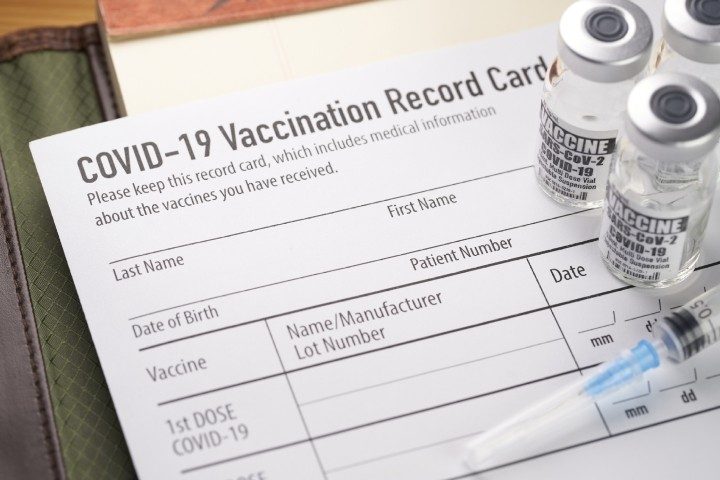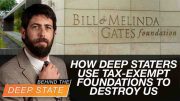
Late last week, California Democrat Governor Gavin Newsom announced that the state would soon be rolling out a new “vaccine verification system” for private businesses to verify customers’ vaccination status.
During a news conference held at Vista Community Clinic on Friday, the governor stated that such a system is very much in the works when asked about verification language included in the state’s latest masking guidance.
On Tuesday, California adopted federal masking guidelines requiring unvaccinated people to continue wearing face coverings indoors, yet the state appears to have lifted all stay-at-home orders, allowing most businesses to reopen at full capacity.
Businesses are given three different options when interacting with unmasked customers and patrons: Trust that they are vaccinated, “implement vaccine verification,” or require everyone to wear a mask.
To date, the only way to verify a person’s vaccination status is to check the paper vaccination card that each person receives when they get a jab. But, reportedly, it has been clear in recent weeks that many have or intend to forge vaccination cards in case the businesses begin to require them.
California’s Attorney General Rob Bonta warned residents in May not to print fake COVID-19 vaccination record cards at home and not to purchase counterfeits. “These counterfeit records undermine the health and safety of Californians and are also illegal,” Bonta said in a consumer alert warning.
Similar warning was also issued by the Federal Bureau of Investigation (FBI).
The state officials advertise the electronic version of the vaccination certificate as a “safer” and “more secure” alternative to a paper version that is easy to fake.
“As it relates to technology and the tools of technology, there are opportunities to make available different strategies to provide a more secure, safe, and transparent form of verification,” Newsom said.
Since all coronavirus doses are recorded in state or county electronic vaccine registry databases, it is technically possible for California to create some method for businesses to access the master database to verify the patrons’ vaccination status and see if they don’t lie about it.
Newsom confirmed that the “vaccine verification” language in the new masking guidelines for businesses does indeed refer to an effort to help private enterprises check inoculation status electronically: “We would look to help support those efforts and modernize the opportunities, and we’ll be making some announcements very shortly in that space,” he said.
The governor stressed that the choice is in the hands of each individual business. Clearly conscious of the backlash against the “vaccine passports,” Newsom insisted that “There is no mandate, no requirement, no passport,” and that use of the electronic system is “voluntary.” Newsom promised to unveil more detail about the system “in the next couple of days.”
On Monday, Newsom repeated that the system would essentially provide people with an electronic version of paper vaccine cards.
Programs currently in use or in development usually have users download an app on their phones, create an account with biometric data, upload vaccination information or coronavirus test results, and show a QR code upon entry into an event or at checkpoints.
San Francisco Chronicle reports that in California, indoor “mega events” defined as more than 5,000 people require either proof of vaccination or a negative COVID test for entry, and the requirement is strongly recommended for outdoor events with more than 10,000 people. Some cruise lines require passengers to be fully vaccinated before boarding, and a number of companies are testing health passport apps for international travel, including VeriFLY, the IATA Travel Pass, and CLEAR Health Pass.
Electronic verification of vaccination has been a controversial issue, with many Californians opposing such measures.
Orange County was working on an electronic verification program until hundreds of people showed up at a Board of Supervisors meeting to protest, arguing that any sort of digital vaccine-verification method would lead to mandated vaccinations, infringe on personal privacy, enable tracking capabilities and lead to discrimination based on medical information. People also unsuccessfully urged the board to ban private businesses from requesting proof of vaccination, calling the practice unconstitutional.
In early June, the California Division of Occupational Safety and Health (Cal/OSHA) adopted the rules that would allow workers in a room to take off their masks only if every person there is fully vaccinated. The decision prompted a coalition of high-profile business groups to send Newsom a letter urging him to issue an executive order overturning Cal/OSHA’s current rules. The board plans to regroup at its June 17 meeting to vote on whether to allow fully vaccinated workers to ditch their face coverings. Workplaces would need to have workers’ vaccine records on file to comply with Cal/OSHA regulations.
The Golden State has been hit hard by the pandemic, which left more than three million Californians with antibodies. Additionally, 64.7 percent of the adult population has received at least one dose of the vaccine, according to the Center for Disease Control. On Monday, Newsom said that there are actually 72 percent of Californians who received at least one dose of a vaccine. Arguably, California has already reached herd immunity against COVID-19, making any restrictive masking regulations or vaccination proof requirements medically fraudulent.




